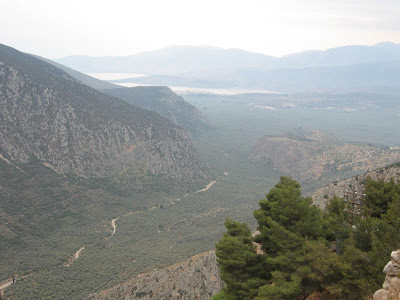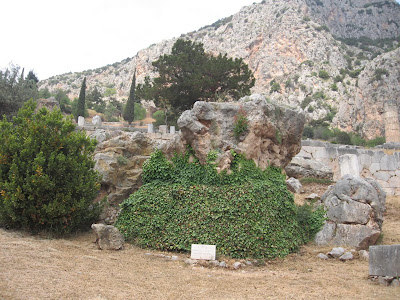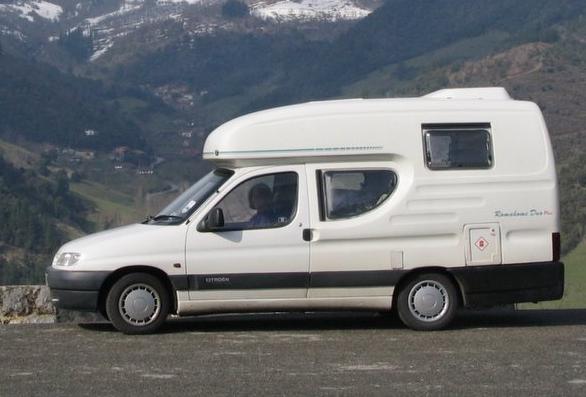Tuesday 13th May 2008, Delphi
Tonight we are camping on the slopes of Mount Parnassus just a few kilometres from the sacred ancient site of Delphi! History is all around us. The skyline of the mountain is the same as it was thousands of years ago. Nearby is the very place where Oedipus accidentally killed his own father, leading ultimately to him marrying his mother and fulfilling the prophecy of the Oracle of Delphi. Here Alexander the Great came, as did countless Greek heroes, to seek advice and a good omen from the Oracle. In a different age, with a different philosophy, we too have come here. Not to seek guidance but to absorb the atmosphere of the past that is so tangible in the unchanging landscape. Perhaps the only thing that really separates us from those heroes of Ancient Greece is Time.
We should not be here really. We were supposed to be on the other side of the sea waiting for David and Lesley to catch us up so we could all take a ride on the Diakofto to Kalavryta rack and pinion mountain railway, high into the hills through the steep, spectacular Vouraikos Gorge. However, when we arrived we found, contrary to our guide books and the information from the previous campsite, that the train was suspended until further notice while repair work was carried out to one of the bridges. The gorge was also closed following rock falls and damage from the fires of last spring.
There seemed little point in waiting until tomorrow for our friends, so we continued along the north coast of the Peloponnese towards Patras where we landed three weeks ago. On reaching Egio we discovered a ferry about to cross the Gulf of Corinth to the deserted, barren, mountainous shores of mainland Greece. This, we decided, would save us several hours of driving, the road chaos around Patras and an expensive night in the campsite we'd used on our first night in Greece. So onto the ferry Modestine bumped. We have been spoilt by Brittany Ferries. No roll-on roll-off ferries here. This one was an old iron rust bucket that rocked and swayed with every wave that broke against her sides on the hour long crossing. Once on board we had to manoeuvre Modestine round so she could be driven off when we reached the other side. Apart from us there was one other vehicle but the fuss they made about how we turned her and exactly where she stood on deck was hilarious.


On the far side we found the coast road deserted and reached this campsite in Delphi just as dusk fell and the rain closed in. The landscape on this side of the Bay of Corinth is far wilder than over in the Peloponnese and reminded us both of driving down the coast of Croatia last year. Barren, crumbling yellow/red rock looms above the road while the blue sea lies down below. Other than sparse shrubs, bushes, herbs, grasses and heathers, there is little to see. For long distances there is no sign of human life. In Britain this would be a protected landscape of outstanding natural beauty, but here in Greece, it is just like everywhere else in the country! The mountains are rich in bauxite which is mined for the production of aluminium. Occasionally therefore, we passed through small villages near roadside quarries and factories.


Texting is brilliant. We sent a message to our friends telling them to skip the mountain railway, catch the 1.30 ferry tomorrow and join us at Delphi instead! Hopefully they will find diesel as easily in the small villages as we did despite the strike which still continues.

Wednesday 14th May 2008, Delphi
It worked! Exactly on time, Erik turned up and settled down comfortably beside Modestine. Meanwhile, making the most of a lull in the rain that has continued for much of the day, we had set off on a strenuous walk along the ancient path up to the ruins of Delphi. This was the same path as would have been used several thousand years ago as suppliants came to ask advice of the Oracle or to make votive offerings at the temple of Apollo. Oedipus might well have placed his foot on the very same stones as us! Further more, the landscape would have been exactly the same. There was nothing visible anywhere on the face of the bare, brooding mountains that might indicate we were in 2008AD and not 2008BC! Goats still roamed wild on the hillsides and the flowers, grasses and stunted bushes back then would have existed exactly as they are today. So overgrown and tumbled was the track however, that we doubted whether anyone had been this way since then! After three kilometres of hard climbing we emerged onto the streets of the present day town of Delphi. This caters unashamedly for tourists who still thronged the streets despite the nearby ancient site closing at 2.30pm. There were restaurants, guest houses, hotels, fast food stores and souvenir shops.



There is a definite advantage to seeing an ancient site after it has closed for the day and the crowds have left. Mount Parnassus loomed huge and mysterious above the ruins and the aura of the past enveloped us. When we return tomorrow it will be crowded with coaches and visitors again. It is such a pity though, that no sites are open beyond 3pm and some, such as Delphi, close even earlier. We discovered that areas outside the main complex remain open and are free, so we were able to explore the Temple to Athena and the Gymnasium, both remarkable more for their setting than their content. Huge stone boulders had broken off the mountain and crashed down onto the ruins. All along the roadside too, lay equally large boulders.



We were already weary from our long climb and scrambling around the ruins. It began to rain again and we faced a 5 kilometre walk back along the road to the campsite. We decided against scrambling back the way we had come in the rain. The stones would be slippery and mist was closing in. Have we mentioned that in Greece they are letting their kilometres drift until they reach parity with the mile? Five Greek kilometres on the slopes of Mount Parnassus in the rain are more than equal to five English miles! We returned to Modestine soaked through and have spent the evening steaming gently as we use the campsite wifi to catch up on our blogs and emails.


Thursday 16th May 2008, Delphi
Yesterday we visited the Oracle of Delphi, situated at the navel of the world! We took the bus up the mountainside to conserve our energy for looking around the museum and the steeply sloping archaeological site. The museum contained exhibits found on the site, the highlights being a couple of larger than life beautiful statues of young men, a bronze charioteer and the cosmic belly-button.



At the nearby site we were swept around with the crowds along the last stretch of the sacred way, paved with marble and lined with the treasuries erected by the various city states, past the massive columns of the Temple of Apollo and the rock of the Sybil or Oracle. Above is the theatre, second only to that at Epidavros and offering views that even surpass it! Right at the top of the site is the stadium. Every Greek stadium we have seen reminds us how little they have changed over thousands of years. The one at Delphi looked very similar to the one I once reluctantly raced at on school sports day when I was about eleven!







The day was hot and after we had finished with the site there were over three hours until a bus that would drop us near the campsite. So we went for a Greek beer before starting the long walk back down the steep winding road. About half way down a camping car drew up and offered us a lift. The owners had recognised us as neighbours on the campsite in Corinth! We were so grateful, arriving back a good hour sooner than we expected. Later David and Lesley returned from Delphi, weary from their long walk, not having had our good fortune. Too tired to cook we went for a meal together at the campsite restaurant with its wonderful view down to the Gulf of Corinth. We had Greek salad followed by lamb in lemon sauce with rice and found it good, but David and Lesley's pork souvlaki was less of a success.
This morning, Thursday, we decided to visit the isolated Byzantine monastery of Osios Loukas (Holy Luke) about 30 kilometres away along empty mountain roads. We drove up through the narrow, crowded streets of Delphi tailing a lorry loaded with builder's rubble. In the centre of the town it stopped, the doors opened and the driver and passenger went off in opposite directions, one to a nearby cash machine, the other to join a queue at the bakers! Meanwhile we waited patiently, as did the police car that had been wedged in by the lorry! Eventually they returned and cheerfully drove on with a tailback of waiting vehicles. The Greeks really are the most laid-back drivers imaginable.
Luke was born in Delphi in the 10th century and, like us at the site yesterday, found it all a bit noisy. Seeking peace and calm he headed off to the wildest spot he could find in Central Greece and founded a monastery there. It is still a wild, deserted and stunningly beautiful place today. Built on a steep slope the monastery overlooks a tranquil, fertile valley of vines, olives, fruit orchards and arable crops.

Built in 1011 it is one of the most important Byzantine buildings in Greece. The church is octagonal with a central cupola and contains many beautiful mosaics from the 11th century. Much damage was done during an earthquake during the 17th century and some of the mosaics were replaced by painted frescoes. In later years, under the Ottoman occupation and the struggle for Greek independence, the monastery was the centre of much fighting. It was here that Bishop Isaias declared his support for the Greek freedom fighters. There is a statue to him in the courtyard. In the crypt beneath the church is the sarcophagus of Holy Luke.





In the former monks' refectory is an exhibition of Byzantine finds – broken marble columns, crosses, carved frames and lintels while above the original stables is a colourful collection of 18th century icons of saints including St. George – patron saint of Greece as well as England. Nearby we discovered a tiny, perfectly restored 10th century chapel.






We returned to the car park to find Erik had followed Modestine and was parked beside her. Leaving him there we started our return journey.
As we entered one of the few villages in this wild and empty countryside Modestine began to limp. Like Erik a few weeks ago, she had got a puncture from the dreadful Greek roads. When a Romahome gets a puncture there is no way you can fix it without help. As we set off to walk into the village, Erik came along and David and Ian drove off in search of help.
Here we have to say that we owe an immense debt of gratitude to the Greek people we have met here. We thought the hospitality we had been shown at Easter in Olympia was amazing. Today we have experienced unbelievable kindness and good humour.
In the centre of the village we eventually found someone who spoke a little English and explained our predicament. He immediately jumped into his car and drove to where Modestine stood forlornly by the roadside. The wheel was quickly removed and the spare eventually extricated from the inaccessible cradle underneath. However, he seemed very reluctant to use it. Eventually he did so and told us to follow him to get the puncture repaired. The village tyre man was taking his siesta until 5pm so we said we'd wait a couple of hours and get a mineral water at the nearby bar. He refused to take any money for his help but joined us for a drink. When Ian went to pay, the barman said it had already been paid for and refused our money! Meanwhile they phoned the tyre man who arrived immediately and told us to continue with our drink while he fixed it. He returned waving a sharp screw he'd found in the tyre tread. The puncture was fixed but both he and our kind friend were adamant that we had to have the original tyre replaced. As it's a perfectly good spare, almost new, we were surprised but accepted it, not having the language to question it. Once the spare tyre had been removed they showed me, written on the side "made in Turkey"! There was no way, they told me, that they would allow me to drive on Greek roads with a Turkish tyre! It's nearly 200 years since independence from the Ottomans and these young men were half our age but still the feelings run high! By this time there was quite an audience of villagers gathered round to watch. They admired Modestine, patting her sides and saying "fibreglass" with great curiosity.
The tyre repair man charged us 10 euros, the cafe man refused payment for our drinks and the person who had done so much to help us throughout also refused payment! Everyone shook hands and melted away. As the supermarket was closed we couldn't buy some beer as a thank you so in the end we put some money in an envelope and Ian managed to work out the Greek words and letters to say "Thank you from two English people." We still had a bar of Kitkat from England so took it and the envelope and went in search of our kind friend. He smiled with amusement when we asked if our Greek was any good and this time accepted them as gifts. We felt much better for that.
Once David and Lesley had realised we would be okay they had continued on to our campsite, leaving us in the village. Sooner than we could ever have expected we rejoined them. While our suppers cooked we sat outside between Erik and Modestine reflecting on the kindness we have all received at different times while we have been travelling. We don't want problems to arise, but when they do, it always seems to bring out the very best in people. We really hope visitors to England might meet with similar kindness if they ever needed help.

